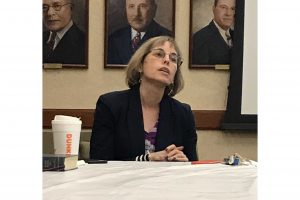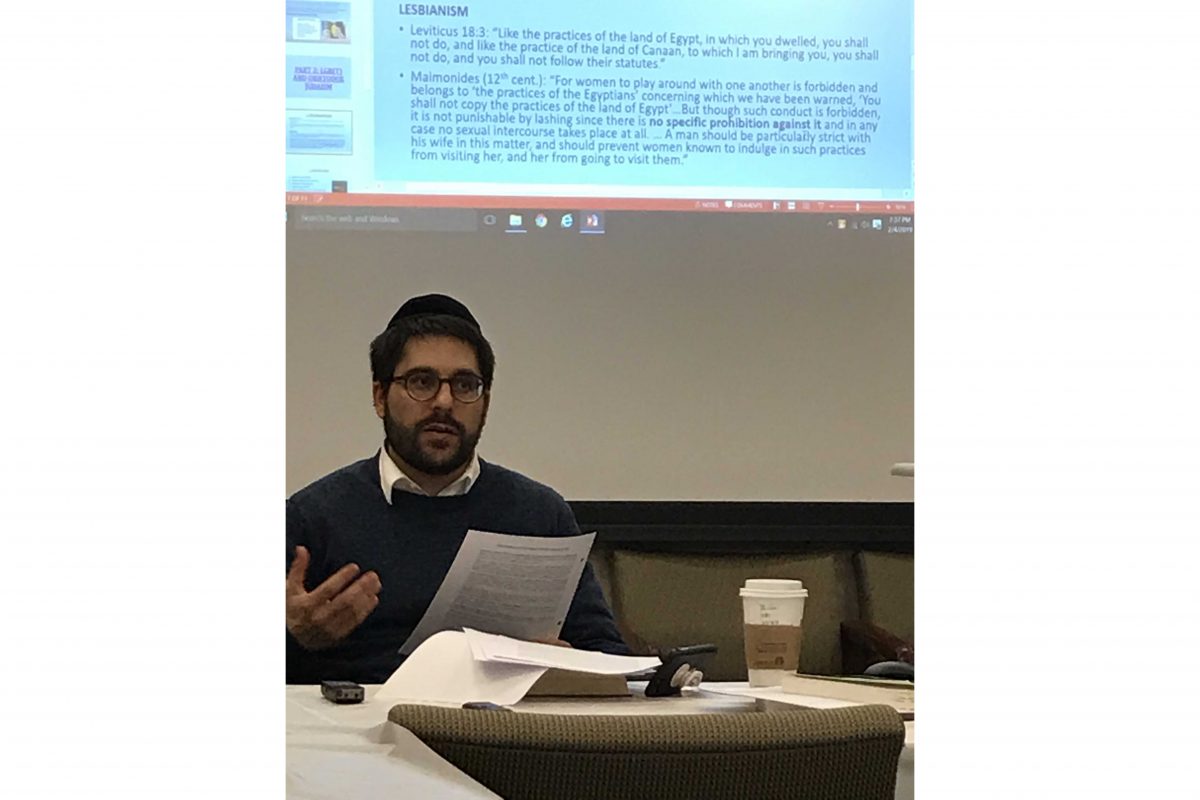Eighth installment in an ongoing series
So far in Rabbi Eli Yoggev’s Judaism for Beginners class at Beth Tfiloh, I’ve sat quietly and patiently, getting my learn on, agreeing to disagree on certain topics and even coming to terms with what I consider some deeply buried psycho-babble.
Because Rabbi Yoggev is such an excellent, patient and level-headed teacher, there were things I definitely took away from the class – if not a total embrace of the subject matter, at least a long-overdue understanding for some of the whys and hows. Rabbi Yoggev might have even thought he was starting to make some headway with this particular heathen.
But during the Feb. 4 session on “Hot Button Issues,” it became very apparent that all bets were off. This is, indeed, where I drew the line. Sorry, Rabbi, this bleeding heart social liberal just can’t mesh the teachings of Orthodoxy with where we are as a society. (A society in which Jay-Z and Frank Ocean can collaborate in the previously homophobic land of hip-hop, as Rabbi Yoggev himself, pointed out.)
Let me back up. We attempted to cover three topics in this particular class: Women and Orthodox Judaism, LGBT and Orthodox Judaism (except not the T — no time to get into that particular hornet’s nest) and Jews and non-Jews.

We started with a special guest, Beth Tfiloh’s Rabbanit Bracha Jaffe, because as Rabbi Yoggev said, “She has more experience with women and Orthodoxy than I do.”
Rabbanit Jaffe quickly ran through some of the major issues that arise when trying to align being a woman with being Orthodox. First, there’s that pesky blessing about thanking God for not “making me a woman” (one of the morning blessings recited daily by observant Jews). “These words could feel offensive or difficult to people, so we [at Beth Tfiloh] don’t hear the prayer leader say it out loud,” Rabbanit Jaffe said.
There’s a host of literature on how women justify saying this blessing. But one primary belief is that the passage is simply referring to the fact that men have more mitzvot (commandments) to perform than women and they are expressing their thanks for the extra work. There are time-bound mitzvot (blowing the shofar, sitting in sukkot, wearing tefillin) that women are not necessarily obligated to perform. Some mitzvot thought of as women’s mitzvot include baking challah and lighting candles, but if there’s no woman on hand, a man can perform these.
“When Jewish law was set up, gender roles were very defined,” Rabbanit Jaffe said. “We’re not the same.”
On the subject of a minyan, which requires 10 men (in Orthodox Judaism), Rabbanit Jaffe says she doesn’t have a problem with not being counted because she chooses Orthodoxy. She’s merely following the rules according to Halachah, or Jewish law. “I accept that,” she said. “It’s part of the rules that I buy in to.”
Rabbi Yoggev agrees, “As a Rabbi in Orthodox Judaism, there are things I grapple with. But, I’ve accepted the general framework,” he said.
See, because of the time I’ve spent with Rabbi Yoggev and the conversations we’ve had, I think I know that he’s a pretty cool guy. I’m guessing he is socially liberal. He might even have some feminist inclinations, and he definitely doesn’t have a personal problem with gay people. So the thing I just can’t quite get over is if fundamentally you believe in equal rights for all beings, why be Orthodox? Though he has tried to explain or justify his beliefs, this is where we will never see eye-to-eye.
Rabbanit Jaffe excused herself to go to another meeting and we moved on to an even hotter button: Being gay and Orthodox.
It all goes back to Leviticus 18:22 in which it says, “You shall not lie with a male as with a woman. It’s an abomination.” It’s worth noting there’s no clear Biblical passage about lesbianism. At some point, the Rabbis said you shouldn’t do the practices of Egypt. But your guess is as good as mine as to how Egypt earned this reputation as a hotbed of Sapphic behavior.
To their credit, most Orthodox rabbis accept that being gay is something someone’s born with, Rabbi Yoggev says. They don’t believe in undoing the internal identity of someone who’s gay. Most Orthodox rabbis do not believe in reparative therapy, Rabbi Yoggev continued. “You can not pray the gay away.” Well, thank God for small favors.
Interestingly enough, Rabbi Yoggev said the passage in Leviticus is one of the top questions with which his young students are most concerned and he had a particularly thorough handout on the topic. One mainstream approach, according to the handout, encourages “acknowledging the inclination, but in no shape or form does it condone acting on it.” It’s even suggested that the person could use the extra energy to become a servant of the community. Think of it as a sort of epic challenge, they say.
Another view asks, “Is it not cruel to condemn an individual from doing that which his biological and genetic makeup demand that he do?” Apparently, if the individual is acting out of compulsion, he would not be held culpable for his act. According to Jewish law, one isn’t held liable for sins performed under duress. OK, better.
This is the age-old cheeseburger argument. If the choices are eat the cheeseburger or die, you’re going to eat the cheeseburger. It wasn’t a choice. It was forced upon the person. So, not responsible for the sin.
“Orthodoxy doesn’t have a clean solution to this predicament and that’s the tragedy,” Rabbi Yoggev said. Tragic, indeed. Especially since so many houses of worship are struggling to get their membership numbers up. You’d think they’d take what they can get. Beth Tfiloh and Rabbi Yoggev do not perform same-sex weddings, but Rabbi Yoggev said he knows there are gay congregants at the synagogue.
Because, of course, there are. Something like one in every 20 people in Baltimore City is gay.
“We should try to connect to any Jew, no matter what they’re doing,” Rabbi Yoggev said. See? He’s a good guy. “Beth Tfiloh accepts anyone who comes here [i.e., those who drive there on Shabbat, which is overlooked]. We draw this line, and some of it is connected to homophobia. We shouldn’t draw the line here.”
Right. Dear Orthodoxy: Just stop it. Get with the times.
Not for nothing, the Torah also forbids anal sex and calls that an abomination, too. But, as Rabbi Yoggev said, there’s a lot of things described in the Torah as abominations – idolatry, dietary violations. … So, singling out homosexuality specifically for that reason isn’t entirely accurate. Clearly, lots of other things are also classified as abominations. Hmph.
Rabbi Yoggev noted that acceptance vs. non-acceptance can lead to dangerous things and, at that point, it really does become a life-and-death situation. For further study, our resident rabbi/critic also recommended “Trembling Before G-d,” a 2001 documentary about lesbian and gay Chasidic and Orthodox Jews.
For me it all comes down to one thing. I don’t really like rules. But I really don’t like being told when, where and what I can eat and when, where, in what ways and with whom I can do The Deed. On this, the penultimate class of the semester, I can say with 100 percent conviction, I have not found the path to an Orthodox belief system. I have digested a lot of information and gained greater understanding into why other people believe, however. Rabbi Yoggev gets the kudos for that.
One note: We ran out of time before we could deep-dive into the issue of Jews with non-Jews, but I did learn that there are 7 Noahide Commandments: Don’t worship idols, don’t curse your god, don’t murder, don’t eat a limb of a living animal, don’t steal and don’t commit sexual immoralities (judgy much?) and establish courts of law. Non-Jews who abide by these basic moral laws can be accepted into Heaven. So, we’re down with them. Though, on the Jewish mother oy gevalt scale, I’m still not clear if more brownie points are earned for being straight but with a non-Jew or being religiously Jewish but gay. Either way, I’m a little bit bummed out that Rabbi Yoggev won’t marry me without a nice Jewish boy or any of my gay friends, but I’m single so we can put that topic to bed. For now.
Next up: Feb. 25 — Ask the Rabbi (last class, rescheduled due to snow) — The moment we’ve all been waiting for. Maybe we’ll get to the bottom of several burning questions: The rumored hole in the sheet, multiple genders, the dating life of a single rabbi, etc.
[box type=”shadow”]Here’s the original class schedule:
Basics —
Nov. 19: What You Need to Know About Judaism,
Nov. 26: Foundations of Jewish Belief,
Dec. 3: Jewish History 101
Jewish Life and Spirituality —
Dec. 10: Daily Jewish Living,
Dec. 17: Life Cycle Events,
Dec. 24: Prayer,
Jan. 7: Jewish Spirituality
Practical Judaism —
Jan. 14: Introduction to Jewish Law and Custom,
Jan. 21: Shabbat,
Jan. 28: Festivals
Judaism for Today —
Feb. 4: Hot Button Issues,
Feb. 11: “Ask the Rabbi” Session
For more information, contact eyoggev@btfiloh.org.
[/box]
See Rabbi Eli Yoggev’s Feb. 8 appearance on Your Weekend Agenda on Facebook Live:





